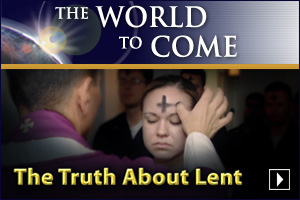Why did Paul say that he would be with Christ, since he knew that, upon his death, he would be going to the grave? Was he saying that he wished to die and immediately go to heaven?
As with many other scriptures in the Bible, people interpret these verses according to their own pre-conceived ideas and beliefs. Many cite this scripture as proof that Paul knew that he was “going to heaven” when he died. But nowhere did he mention that he would immediately be with Christ, or that he would be with Him in heaven.
In order to properly understand the meaning of these verses, other scriptures must be considered. In his second letter to Timothy, Paul wrote, “For I am now ready to be offered, and the time of my departure is at hand. I have fought a good fight, I have finished my course, I have kept the faith: Henceforth, there is laid up for me a crown of righteousness, which the Lord, the righteous Judge, shall give me at that day: and not to me only, but unto all them also that love his appearing” (II Tim. 4:6-8). This shows that Paul knew he would have his reward “at that day” and at “His (Christ’s) appearing,” rather than at death.
Paul explains here the meaning of his words, “to be with Christ.” He would not be rewarded immediately upon death. All faithful Christians who have lived and died throughout history will be given their reward at the same time, “at that day”—at Christ’s Second Coming: “Behold, the Lord God will come with strong hand, and His arm shall rule for Him: behold, His reward is with Him, and His work before Him” (Isa. 40:10). Also, “…behold, I come quickly; and My reward is with Me, to give every man according as his work shall be” (Rev. 22:12). (Also notice I Thessalonians 4:16-17; I Corinthians 15:52; and Daniel 12:2-3). Christians do not die and go to heaven. They wait (in the grave) for Christ to return to this earth, “His reward with Him.”
In I Thessalonians 4:16-17, Paul wrote, “For the Lord Himself shall descend from heaven with a shout, with the voice of the archangel, and with the trump [“the last trump” (I Cor. 15:52)] of God: and the dead in Christ shall rise first: Then we which are alive and remain shall be caught up together with them in the clouds, to meet the Lord in the air: and so shall we ever be with the Lord.” Daniel 12:2 shows that those “that sleep in the dust of the earth shall awake” to meet Christ at His Return.
The dead are not now with Christ. They have not been with Him and the Father for all this time. They are waiting for the time in the future when they will awaken from the dust of the earth (Gen. 3:19), and rise “to meet the Lord in the air.” At that time, God will raise all of His faithful servants (“the dead in Christ”) as incorruptible spirit beings, having immortal life (II Cor. 5:1-10). So then, why did Paul express that he would rather “be absent from the body, and to be present with the Lord”?
His answer is found in II Corinthians 5:2: “For in this we groan, earnestly desiring to be clothed upon with our house which is from heaven [the spirit-composed body that God will give us upon our resurrection through the power of His Holy Spirit].” Paul initially expected that Christ would return during his lifetime and change his vile body. He eventually came to realize that Christ’s Return would take place much later (II Thes. 2:1-6).
Paul knew the dead who “sleep in the dust of the earth shall awake” (Dan. 12:2). He also understood Ecclesiastes 9:5-6, 10 and Psalm 146:4. These verses show that when a person dies, his thoughts perish, and he is unaware of the passing of time. Paul knew that his next waking moment would be in the resurrection, and seem as though it happened immediately, not 2,000 years later.


















